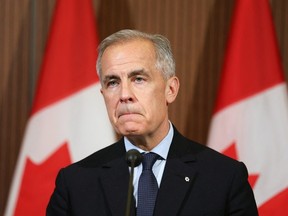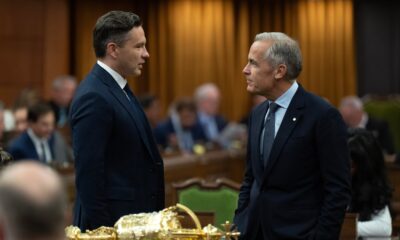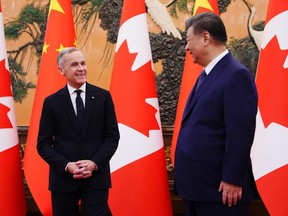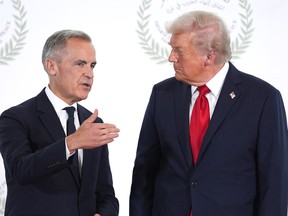Politics
Political Dynamics Surrounding Palestinian Statehood Intensify

Calls for the establishment of a Palestinian state have gained momentum, particularly following statements from leaders like Prime Minister Mark Carney. However, the notion that such a state would resolve longstanding conflicts and enhance security for Israel has faced significant criticism. Detractors argue that without credible leadership committed to peace on both sides, the creation of a Palestinian state may not lead to the desired outcomes.
The historical context is critical in understanding the current situation. Israel unilaterally withdrew from Gaza in 2005, relocating approximately 9,000 Jewish settlers from 21 settlements. This pullout was initially seen as a step towards peace. Instead, it led to the rise of Hamas, which has since used Gaza as a launchpad for attacks against Israel. Critics assert that Hamas’s ultimate goal is not the establishment of a peaceful Palestinian state but rather the elimination of Israel’s Jewish population, a sentiment echoed in its founding charter.
At the heart of the recent discussions is the leadership of Mahmoud Abbas, the President of the Palestinian Authority. Abbas, who is 89 years old and widely viewed as unpopular among Palestinians, has faced allegations of corruption. Polls indicate that many Palestinians desire his resignation, viewing his Fatah party as ineffective despite receiving considerable foreign aid.
On the Israeli side, Prime Minister Benjamin Netanyahu remains opposed to the creation of a Palestinian state. He has signaled intentions to expand Israeli settlements in the West Bank, which is home to approximately 700,000 Jewish settlers, according to international law. His government recently passed a symbolic motion to annex parts of the West Bank. Netanyahu’s handling of security has come under scrutiny, particularly following the severe attacks by Hamas on October 7, 2023, which resulted in significant casualties among Israeli civilians.
Supporters of Netanyahu argue that he is uniquely positioned to counter threats from Hamas and Iran, especially in light of recent military operations targeting Iranian nuclear facilities. However, he faces accusations of fostering a climate that allows Hamas to thrive, a strategy that dates back to the 1980s when Israel reportedly supported Hamas as a counterbalance to the Palestine Liberation Organization (PLO).
The debate over the Israeli-Palestinian conflict also raises complex issues regarding criticism of Israel. While some assert that calling out Israeli policies equates to antisemitism, others, including Israelis themselves, argue that internal dissent is vital for any meaningful resolution. Notably, former Shin Bet director Avraham Shalom has publicly criticized the occupation, likening the situation to historical injustices, though he emphasizes that comparisons should be approached with caution.
As the international community continues to engage in discussions about the future of a Palestinian state, the intricate political dynamics between leaders on both sides remain a significant barrier to achieving lasting peace. The current landscape suggests that without genuine commitment from both Israeli and Palestinian leadership, the path toward a viable and peaceful resolution remains fraught with challenges.
-

 Politics3 months ago
Politics3 months agoSecwepemc First Nation Seeks Aboriginal Title Over Kamloops Area
-

 World7 months ago
World7 months agoScientists Unearth Ancient Antarctic Ice to Unlock Climate Secrets
-

 Top Stories1 month ago
Top Stories1 month agoUrgent Fire Erupts at Salvation Army on Christmas Evening
-

 Sports1 month ago
Sports1 month agoCanadian Curler E.J. Harnden Announces Retirement from Competition
-

 Lifestyle5 months ago
Lifestyle5 months agoManitoba’s Burger Champion Shines Again Amid Dining Innovations
-

 Top Stories2 months ago
Top Stories2 months agoFatal Crash on Highway 11 Claims Three Lives, Major Closure Ongoing
-

 Entertainment7 months ago
Entertainment7 months agoTrump and McCormick to Announce $70 Billion Energy Investments
-

 Science7 months ago
Science7 months agoFour Astronauts Return to Earth After International Space Station Mission
-

 Lifestyle7 months ago
Lifestyle7 months agoTransLink Launches Food Truck Program to Boost Revenue in Vancouver
-

 Technology5 months ago
Technology5 months agoApple Notes Enhances Functionality with Markdown Support in macOS 26
-

 Top Stories1 month ago
Top Stories1 month agoBlue Jays Sign Kazuma Okamoto: Impact on Bo Bichette’s Future
-

 Top Stories2 months ago
Top Stories2 months agoNHL Teams Inquire About Marc-André Fleury’s Potential Return





















